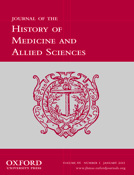
In ethics, casuistry is a process of reasoning that seeks to resolve moral problems by extracting or extending theoretical rules from a particular case, and reapplying those rules to new instances. This method occurs in applied ethics and jurisprudence. The term is also commonly used as a pejorative to criticize the use of clever but unsound reasoning, especially in relation to moral questions. It is the "[s]tudy of cases of conscience and a method of solving conflicts of obligations by applying general principles of ethics, religion, and moral theology to particular and concrete cases of human conduct. This frequently demands an extensive knowledge of natural law and equity, civil law, ecclesiastical precepts, and an exceptional skill in interpreting these various norms of conduct." It remains a common tool for applied ethics.
The history of science and technology (HST) is a field of history that examines the understanding of the natural world (science) and the ability to manipulate it (technology) at different points in time. This academic discipline also studies the cultural, economic, and political impacts of and contexts for scientific practices.

Science is a systematic endeavor that builds and organizes knowledge in the form of testable explanations and predictions about the universe.

Philosophy of science is a branch of philosophy concerned with the foundations, methods, and implications of science. The central questions of this study concern what qualifies as science, the reliability of scientific theories, and the ultimate purpose of science. This discipline overlaps with metaphysics, ontology, and epistemology, for example, when it explores the relationship between science and truth. Philosophy of science focuses on metaphysical, epistemic and semantic aspects of science. Ethical issues such as bioethics and scientific misconduct are often considered ethics or science studies rather than the philosophy of science.
Islamic studies refers to the academic study of Islam, and generally to academic multidisciplinary "studies" programs—programs similar to others that focus on the history, texts and theologies of other religious traditions, such as Eastern Christian Studies or Jewish Studies but also fields such as —where scholars from diverse disciplines participate and exchange ideas pertaining to the particular field of study.
Degree abbreviations are used as an alternative way to specify an academic degree instead of spelling out the title in full, such as in reference books such as Who's Who and on business cards. Many degree titles have more than one possible abbreviation, with the abbreviation used varying between different universities. In the UK it is normal not to punctuate abbreviations for degrees with full stops, although this is done at some universities.

Unani or Yunani medicine is Perso-Arabic traditional medicine as practiced in Muslim culture in South Asia and modern day Central Asia. Unani medicine is pseudoscientific. The Indian Medical Association describes Unani practitioners who claim to practice medicine as quacks.

Isis is a quarterly peer-reviewed academic journal published by the University of Chicago Press. It covers the history of science, history of medicine, and the history of technology, as well as their cultural influences. It contains original research articles and extensive book reviews and review essays. Furthermore, sections devoted to one particular topic are published in each issue in open access. These sections consist of the Focus section, the Viewpoint section and the Second Look section.

Philosophy is the systematized study of general and fundamental questions, such as those about existence, reason, knowledge, values, mind, and language. Some sources claim the term was coined by Pythagoras, although this theory is disputed by some. Philosophical methods include questioning, critical discussion, rational argument, and systematic presentation.

Clinical Science is a peer-reviewed medical journal that covers all areas of clinical investigation, with a focus on translational science and medicine. The journal is currently published biweekly by Portland Press on behalf of the Biochemical Society.
Evidence-Based Complementary and Alternative Medicine is a peer-reviewed open-access medical journal covering complementary and alternative medicine published by Hindawi Publishing Corporation.

The Journal of the History of Medicine and Allied Sciences is a quarterly peer-reviewed academic journal that was originally published by the Department of the History of Medicine at Yale University and now is continued by Oxford University Press. It covers research on the history of medicine and was established in 1946. The editor-in-chief is Christopher Crenner. According to the Journal Citation Reports, the journal has a 2011 impact factor of 0.714.

The Journal of the National Cancer Institute (JNCI) is a peer-reviewed medical journal covering research in oncology that was established in August 1940. It is published monthly by Oxford University Press and is edited by Patricia A. Ganz. It was merged with Cancer Treatment Reports in January 1988. JNCI used to be the official journal of the National Cancer Institute (NCI); however, in 1996, the NCI and JNCI agreed to grow apart. Over the next five years, JNCI became independent of the NCI.

The Sociological Review is a quarterly peer-reviewed academic journal covering all aspects of sociology, including anthropology, criminology, philosophy, education, gender, medicine, and organization. The journal is published by SAGE Publications; before 2017 it was published by Wiley-Blackwell. It is one of the three "main sociology journals in Britain", along with the British Journal of Sociology and Sociology, and the oldest British sociology journal.
David DeGrazia is an American moral philosopher specializing in bioethics and animal ethics. He is Professor of Philosophy at George Washington University, where he has taught since 1989, and the author or editor of several books on ethics, including Taking Animals Seriously: Mental Life and Moral Status (1996), Human Identity and Bioethics (2005), and Creation Ethics: Reproduction, Genetics, and Quality of Life (2012).
Jeffrey Paul Bishop is a philosopher, bioethicist, author and the Tenet Endowed Chair of Health Care Ethics at Saint Louis University. The director of the Albert Gnaegi Center for Health Care Ethics, he is most widely recognized and cited for work in medical ethics as relating to death and dying in addition to contributions in the field of medical humanities. Bishop is a physician, holds a Doctorate of Philosophy from the University of Dallas and serves on the editorial boards of both the Journal of Medicine and Philosophy and the Journal of Christian Bioethics for Oxford University Press.
The Journal of Urban Health is a bimonthly peer-reviewed public health journal which serves as a vehicle for publishing articles relevant to urban health including the broader determinants of health and health inequities. It was established in 1851 as the Transactions of the New York Academy of Medicine, and was renamed the Bulletin of the New York Academy of Medicine in 1925. It obtained its current name in 1998. Its parent organization is the New York Academy of Medicine (NYAM). The journal is published by Springer Science+Business Media along with NYAM. The editor-in-chief is David Vlahov. According to the Journal Citation Reports, the journal has a 2021 impact factor of 5.801.
The philosophy of medicine is a branch of philosophy that explores issues in theory, research, and practice within the field of health sciences. More specifically in topics of epistemology, metaphysics, and medical ethics, which overlaps with bioethics. Philosophy and medicine, both beginning with the ancient Greeks, have had a long history of overlapping ideas. It was not until the nineteenth century that the professionalization of the philosophy of medicine came to be. In the late twentieth century, debates among philosophers and physicians ensued of whether the philosophy of medicine should be considered a field of its own from either philosophy or medicine. A consensus has since been reached that it is in fact a distinct discipline with its set of separate problems and questions. In recent years there have been a variety of university courses, journals, books, textbooks and conferences dedicated to the philosophy of medicine.
Theoretical Medicine and Bioethics: Philosophy of Medical Research and Practice is a bimonthly peer-reviewed medical journal covering bioethics and the philosophy of medicine with a more theoretical outlook than other journals in this area. It was established in 1980 as Metamedicine and was renamed Theoretical Medicine in 1983, obtaining its current name in 1998. It is published by Springer Nature and offered at a reduced rate to members of the American Society for Bioethics and Humanities. The editors-in-chief are Lynn Jansen and Daniel Sulmasy. According to the Journal Citation Reports, the journal has a 2018 impact factor of 0.789.

Jeremy Howick is a Canadian-born, British residing clinical epidemiologist and philosopher of science. He researches evidence-based medicine, clinical empathy and the philosophy of medicine, including the use of placebos in clinical practice and clinical trials. He is the author of over 100 peer-reviewed papers, as well as two books, The Philosophy of Evidence-Based Medicine in 2011, and Doctor You in 2017. In 2016, he received the Dawkins & Strutt grant from the British Medical Association to study pain treatment. He publishes in Philosophy of Medicine and medical journals. He is a member of the Sigma Xi research honours society.










